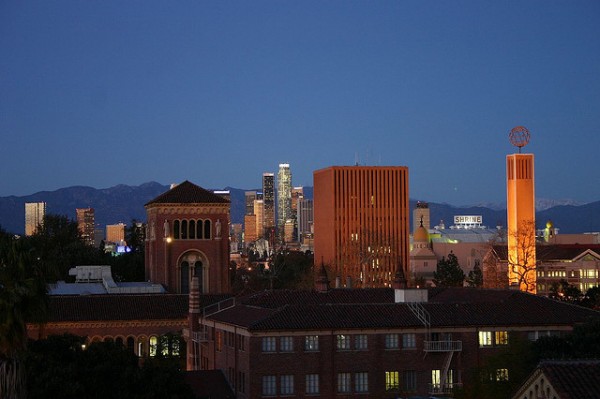Before attending the University of Southern California in the 1990s, I’d heard that the neighborhood regarded SC students as privileged white kids in an otherwise minority neighborhood. People told me I’d be a target for crime.
When I matriculated, I learned what bunk that was. SC students were part of the neighborhood, not aloof or above it. Many of my fellow Trojans donated time in the community, and the university helped direct many students to volunteer positions in the neighborhood. SC had (and still has) programs providing neighborhood kids with a pathway to university admission and scholarships to pay for it. Even late at night, living for three years off-campus, I never felt endangered.
That’s why I was surprised when USC blocked access to its campus after 9 p.m. Now, only students, faculty, administrators, and their respective registered guests may access the campus at night. That doesn’t seem like the USC I know.
People at USC have good reasons to move off and on campus at all hours. After freshman year, most students live off campus. Many students also commute. Sure, flashing an ID allows them late-night access, but figuratively those students are locked out.
When I was in school I had late-night classes. One class let out as late as 10 or 11 on some nights. But even at that hour the campus seemed alive: people going to Traddy’s (USC-speak for Traditions, the on-campus bar), walking to dorms, getting something to eat, and transiting campus.
These days, I often visit campus before USC football games. My friends and I gather for a pre-game picnic and walk from campus to the Coliseum. After games, I’ve often walked back through campus, either to meet someone or get back to my car. Many games finish after 9 p.m. Will the gates be locked?
I also return to campus a few nights a year for meetings of alumni groups. Maybe those meetings will have to be moved off-campus now. If so, I suspect many alums will stop going. Visiting the campus as an alumnus feels special—like being a student again—especially at night, when things are quieter.
In saying all this, I don’t mean to minimize the dangers of having a college campus in the middle of a rough neighborhood. The L.A. riots of 1992 happened during my freshman year. (Part of me wondered if SC students had started them, since final exams got cancelled. It was my favorite semester.) But if the riots taught me anything about USC and community, it was precisely that USC could weather even major upheaval without having to resort to lockdowns.
The campus was indeed briefly closed during the worst of the violence, but not at first. On the first night of the riots, I watched small groups of youths walking in threes and fours down the middle of Jefferson Boulevard with baseball bats and other weapons looking for parked cars and other property to bash. I was amazed at the thin line separating order from chaos. And yet the gates remained open. When my mother, having missed the news of violence (and in an age when cell phones were not yet widespread), came to pick me up to study for finals at home, she picked me up by my dormitory on McClintock Avenue, just inside campus—not more than 100 yards away from Jefferson Boulevard, where I had seen rioters with bats. There was the usual parking officer there, and a campus security patrol car was parked nearby, but there were no other signs of lawlessness.
Eventually, the university did close the gates to campus and left them mostly closed for the duration of the riots. But it was a brief interlude, and the university was hardly touched, even as nearby buildings went up in flames. After the riots, campus rumor had it that SC’s favorable reputation in the community saved it from destruction. While I think the National Guard’s decision to headquarter its command post in Exposition Park across the street had more to do with the university emerging unscathed, there may be some truth to that rumor. For the rest of my time at USC, the gates were open. And if the campus could stay open in the aftermath of that tragic moment in the life of the city, why must the gates be closed now?
Walls create an us-versus-them attitude. When I grew up during the Cold War, they were the symbol of oppression, and the Berlin Wall’s destruction signified a new era. While I don’t expect anyone to demand the University President to “tear down this wall,” turning USC into a fortress just doesn’t feel right. By trying to separate town from gown, USC has divided against itself.
Keith Thorell is a USC graduate and a lawyer in Los Angeles.
*Photo courtesy of Anna Berthold/Flickr.










